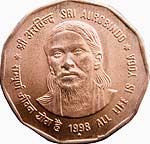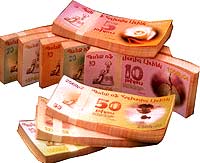- Home
- Archive -Apr 2001
- The color of mo. . .

The color of money
- In :
- Others
By Saurabh Bhattacharya
April 2001
Like it. Loathe it. Want it. Waste it. But you just cannot ignore it. What is the value of money, that rumpled piece of printed-paper in your wallet that the world bows to its power? The secret lies in your own mind!
The four prosperity principles
 |
1. Intention: It is being clear about your life purpose. Your life purpose is what you are here to do. You will know that by paying attention to what works for you and what does not.2. Preparation: Reading, going to school, formal and informal discussion and above all, questioning everything. Argue pros and cons until you come to a point of understanding the ‘why’ of something. This helps convert information into wisdom.
3. Attention: It’s about staying in the present moment. Actually being in your body and observing what is going on with you and around you. Your body will give you very important clues, which will help you make more informed choices.
4. Action: This is the purpose for which you have prepared. You are now in the driver’s seat. Choose the best you can and take action.
Money mantra
To get the blessings of Ma Mahalakshmi, the Hindu Goddess of wealth and prosperity, chant the following thrice a day, and watch abundance and affluence surge into your life. Believers say that many lives have changed, many fortunes have been made overnight as the ‘mantra’ recital has been rewarded with the blessings of the Goddess of wealth, through a shower of wealth and riches. (Recite thrice)
Om shreem heem shreem kamle kamalalaye praseed praseed, shreem heem shreem om mahalaxmi namaye.
 |
Let’s talk money! Mammon‘s earthly incarnation. Satan‘s weapon of temptation. Capitalism‘s rightful expression. We are talking about a piece of paper, right? A scrap created from wooden goo that wouldn’t even fetch a glass of water if used for trade on the basis of its actual worth.
So what makes money tick? We love it, we condemn it. We go all out to get as much of it as we can, then we berate it for being a temptation! We live with it and realize our dreams through it, yet are the first to say ‘money can’t buy everything’. Why?
But then, how do you evaluate the worth of something that in itself defines worth, at least commercially? Is money a capitalist weapon for exploitation? Or the most tactile evaluation and reward of our capabilities?
Perhaps it’s only fair that we begin with one of the few people who actually championed money and its philosophical and ethical worth.
VALUE FOR VALUE
‘Money,’ wrote Ayn Rand, cult author and controversial propounder of objectivist philosophy, ‘is a tool of exchange, which can’t exist unless there are goods produced and men able to produce them. Money is the material shape of the principle that men who wish to deal with one another must deal by trade and give value for value.’
The catchphrase is ‘value for value‘. And, maybe, trust in a promise made on a piece of paper. In this sense, money or trade recognizes the belief that nothing in the world is free. Whatever we wish to have, has to be earned. So, if A wants what B owns, or is in a position to give, then A has to give B something of equal worth. Rand believed that only those who did not want to trade would condemn money. Who wanted for free what others had created with their effort and capability.
‘Money has served as a medium of exchange after trying a variety of other items, which were found lacking,’ explains N.K. Somani, CMD of Shree Vindhya Paper Mills, Mumbai. ‘Every person needs products and services in life. Money plays the role of a recognized value for the exchange of commodities and services. If there was no commonly-accepted unit for these transactions, there would be anarchy in the world.’
 |
Rand went a step further in recognizing money as the means of sustenance. ‘Money is the source of survival,’ she wrote in Atlas Shrugged. ‘The verdict you pronounce upon the source of your livelihood is the verdict you pronounce upon your life.’ Perhaps it is worthwhile to wonder why money still draws so much flak. Why is it that most people hesitate to proclaim that they actually like money? What’s the taboo all about? When did a simple tool for exchange metamorphose into an ambivalent entity that is at once a source of shame and exultation?
‘The man who damns money has obtained it dishonorably; the man who respects it has earned it,’ proclaims Ayn Rand boldly.
IS MONEY EVIL?
Remember your first salary check? And the pride you felt to have earned something? How would you have felt if somebody had pointed out that it was wrong to like money? That the pride you were feeling was evil?
A large part of this negative image has come about thanks to a misreading of the scriptures by the world’s major organized religions, notably Christianity and Brahminical Hinduism . Wealth, claimed the pundits of yore, was a sin if it was not accumulated for a ‘godly’ purpose. Renunciation was the catchword, poverty the goal and austerity the norm of the day. If you did not practice these, you were a sinner, decreed to being either reborn as a lower animal if a Hindu, or to be barbecued in the fires of hell, if a Christian. There was, however, an easy way out. Just keep donating money to religious institutions and God would turn a blind eye to how you earn your wealth.
As Canadian Nathan Lester says: ‘Do you see a pattern here? Religion denounces money and then accepts 10 per cent of our earnings!’
But the scriptural truth was far from this bribe-God-be-happy image. Notes American financial consultant and inspirational author J. Grady Cash in his book Value-Based Money Management: ‘Money is not evil. The actual Biblical quote that leads to this common misconception is ‘for the love of money is the root of all evil‘. The ancient Aramaic text might more accurately be translated as ‘for the lust after money is the root of all evil‘. It’s perfectly acceptable to want to make more money. Only when money is accumulated for its own sake or its accumulation hurts others does money become bad.’
 |
Ditto in Hinduism. Artha, or wealth, is legitimate; money is indispensable in the present state of society. A man of the world without money is a failure; he cannot keep body and soul together. In fact, according to an injunction of Hinduism, first comes the body and next the practice of religion. Furthermore, money is needed to build hospitals, schools, museums, and educational institutions, which distinguish a civilized society from a primitive one. Money gives leisure, a key factor in the creation of culture. But money must be earned according to dharma; otherwise it debases a man by making him greedy and cruel.
The basic issue, therefore, is not whether money is evil but whether it has been earned ethically.
THE ETHICS OF WEALTH
Despite knowing this, many of us still shy away from talking about it openly. As New Age guru Deepak Chopra puts it: ‘Most people find it difficult to tell someone exactly how much money they make. This is because they believe that they are worth only what they earn.’
Why should this be so? American journalist Marjorie Kelly tried to answer this question in her article ‘Are you too rich if others are poor?’ (Utne Reader, Sept/Oct 1992): ‘One of our unconscious but profound beliefs about money is that it is a zero-sum game, and that for one person to have more means another has less. In short, that wealth is made on the backs of the poor. But there is an assumption here that is only partly accurate, and that is that money is a physical commodity that can be moved about like a pile of marbles. I suspect that the truth is that money has a dual nature. For if the zero-sum theory holds part of the truth of money, the other part is this: prosperity can beget prosperity.’
 |
John Stussel, host of the 20/20 American TV show’s episode on the positive side of greed, accurately puts it: ‘Bill Gates is a good example. He’s now one of the world’s richest men. He’s got about $40 billion. But does his having $40 billion mean the rest of us have lost $40 billion? No.’
According to Stussel, in a trade-driven economy even if a person is greedy for more wealth, he just can’t grab it from others. ‘To get your money, he has to persuade you, entice you. To do that, he has to make something that you will willingly give him money for. All commerce requires both parties to benefit. Take the simple example. I buy a quart of milk from a farmwoman. I hand her the dollar; she gives me the milk. We both benefit, because she wanted the dollar more than the milk, and I wanted milk more than the dollar.’
Ram Piparaiya, Chairman, Aridhi Hitech Industries, Mumbai agrees: ‘Money does not corrupt. It depends on the user. Corrupt people become more corrupt with it.’ He, however, feels that those who don’t earn but win money, especially through lotteries or gambling, are more likely to be corrupted by it.
B.R. Tangri, chief manager (PR) at the Oriental Bank of Commerce, Delhi, has a pointblank response to the debate: ‘How can money be evil? After all, can one survive without money?’
Actually, the notion that money corrupts is itself debatable. Money, intrinsically, is a means of trade. And the person who holds more money has greater power to dictate the terms of trade. Now, we have all heard that ‘power corrupts‘. But does power corrupt all? What about great leaders who have had the power to shape history, yet did it with integrity and wisdom? Then, shouldn’t the responsibility of not being corrupt lie with the person and not the object of temptation?
‘A knife can be used by a terrorist or by a surgeon,’ agrees Somani. ‘Bofors guns can be used to defend the country or get embroiled in an underhand deal. Whether money corrupts or not depends on one’s attitude and character.’
‘Your attitude towards money,’ says Pradhyot Somaiya, management accountant with Davnet Telecommunications in Sydney, ‘has a significant reflection on your attitude to life. Some people see money as a means to an end, some as a tool to wield power, some as an end in itself-thinking it will bring them happiness. A person who sees money as only a means to satisfy needs will be relaxed and more benevolent than one who craves money for providing self-worth, security or power.’
Money may buy you ten yachts and five mansions. But, as the cliché goes, it really cannot buy you happiness. Or self-worth, for that matter. If you run after money to find what you couldn’t find within, you are chasing a mirage that will only leave you more at a loss.
 |
THE RIGHT ATTITUDE
So what may be the right attitude to money? Joan Sotkin, inspirational teacher and creator of www.prosperityplace.com, views human-money interaction as another form of relationship and argues that laws applicable to any other healthy relationship also govern the attitude towards money. ‘Your individual relationship with money,’ she says, ‘is similar to your relationship with yourself and others. In other words, you deal with money the same way you deal with yourself and others. Your financial relationships develop along the same energy pathways as everything else in your life.’
‘Money,’ says Somaiya, ‘is necessary for my life. Money keeps me comfortable, but it is not the only reason for my happiness. Happiness comes from within me. Money is an indicator of practical success, but not of my self-worth.’
The general attitude towards money, however, is two-fold-we are either eternally running after it or are busy berating our fate for keeping us away from more of it. The grapes are eternally sour and yet we keep jumping for the ever-higher bunch. The few of us who manage to break this vicious cycle are the ones who have a good relationship with money.
In his book, You’ll See It When You’ll Believe It, Dr Wayne Dyer warns against this anomalous attitude: ”If we have a scarcity mentality,’ he argues, ‘it means that we believe in scarcity, that we evaluate our life in terms of its lacks. The theme of so many people’s life is ‘I simply do not have enough’, or ‘I would be a lot happier if I had…’ People believe that they live a life of lack because they are unlucky, instead of recognizing that their belief system is rooted in scarcity thinking. Yet as long as they live with a scarcity mentality, that is what they will attract to their lives.’
Most personal growth trainers, however, insist that this attitude is easily rectified. All it needs is a change in thought patterns regarding money. Says John McMurphy, author of Living Deliberately: ‘Money is only a state of mind; not a reality in, of, or for itself. If money remains a state of mind, therefore a spiritual reality and not an end in itself, then you always will have what you truly need and deserve.’
Easier said than done, you may snort. After all, it does hurt when you see others making less effort at making money but succeeding more than you. Perhaps you could ponder on what it is that successful people do to reach where they are.
SUCCESS V/S MONEY
Like it or not, most often success is judged in terms of a person’s bank balance. In a consumer-driven economy, a penchant for selling—ideas, concepts or products—goes a long way in earning money, as well as in being materiallysuccessful. ‘If you don’t want to sell what you produce,’ asks Lester, ‘why would you produce it?’
Which is why, today, even spiritual leaders and healers need to advertise their unique capabilities because the most successful are those who reach out to a wide variety of people. After all, how would a person sitting in Timbuktoo know where to go for something as esoteric as rudraksha therapy, if not through advertisements?
 |
Despite consumerism, it would be a mistake to read success as a synonym for money. Although the two often go hand in hand, money itself cannot make you a success, and vice-versa. Take A.P.J. Abdul Kalam, former chief of India’s Defence Research and Development Organization. A simple man who came from a not-so-well-to-do family, nobody can deny that he is a success. Yet, who is interested in how much money he makes? What makes him a success is his intellect and achievements.
What about the sages who left all to seek something much more intangible? Were they any less of a success? Would the Buddha have been more successful had he stayed with his palace and wealth?
Money rarely defines a person’s worth in the real sense of the term. In an ideal world, money would change hands ethically and the money that you earn would be directly proportionate to your capability. In the real world, money is often a result of lineage, contacts, unethical shortcuts or exploitation, so that the respect it should demand in ideal circumstances eludes it.
AMBITION OR GREED?
In the ’80s, Gordon Gecko—a reptilian stockbroker played brilliantly by Michael Douglas in Oliver Stone‘s movie Wall Street—extolled greed thus: ‘The point is, ladies and gentlemen, that greed, for lack of a better word, is good. Greed is right. Greed works… Greed captures the essence of the evolutionary spirit.’ Like it or not, in the market-oriented world of today, Gecko might just be stating the obvious. The word greed is defined in the Oxford English Dictionary as ‘intense or inordinate longing, especially for wealth or food; avarice; covetous desire’. It is the inordinate desire for wealth and affluence that has made material evolution possible. At least in terms of trade. Had we not wanted money, would we have got it in the first place?
But even if one accepts Gecko’s argument as factually true, it may not necessarily be ethically correct. As N.K. Sohal, who retired as manager of Hongkong Bank, Northern India says: ‘Money is functional as it sustains life. Human beings have certain basic requirements. Once those are fulfilled, then we begin thinking of comfort. I don’t condemn that because anybody who is working hard is entitled to a certain amount of comfort. But anything beyond that falls under the category of greed.’
‘A person who desires money,’ says Canada-based Adarsh Jain, a professor of philosophy, ‘desires it for a purpose. If you are greedy, you will forever covet, irrespective of how much you have. And this has nothing to do with your social or monetary status. A millionaire can be as greedy as a daily wage earner.’
In fact, in one of political science’s greatest ironies, the twin concepts of communism and socialism-which arose from a desire to overthrow greedy capitalism-also gave in to greed in their practical application.
 |
‘The government,’ says Nathan Newman, ‘transfers wealth to business in indirect ways—society pays to educate and train workforce, takes care of their workers when they are sick, pays for transit system maintenance and provides a whole range of public goods extracted through the public purse. This is a transfer of wealth that is not purely zero-sum, but raises the whole question of whether average folk are getting their fair share of this deal.’
Fair share! This is a topic that keeps cropping up each time we talk about money. Somehow, fair share is often taken to mean equal share, where, irrespective of your capabilities, you get as much as everybody else.
‘Why is it,’ asks US-based software designer Tony, ‘that people should eye what others have earned? Isn’t it against the very basis of religion to covet? Then why should it be considered okay for a ‘have not’ to covet what a ‘have‘ has? And isn’t this greed the very basis of communistic and social welfare philosophy?’
Gecko equated greed with ambition, with the desire to better your own self. Actually there is a subtle difference between the two, and one can easily be transmuted into the other. The difference, most often, lies in the motive. Dan Sullivan, a US-based personal growth trainer, notes: ‘Ambition is the desire to have more, but greed is the desire to have more at the expense of others. Ambition is natural and rational, but greed is a product of fear. Where there is no fear, there is no greed.’
So, if you want money without being attached to it, you remain free of greed in spite of being in the rat race. But when you let money dictate your life, you become its slave, and in the end, money begins to rule you.
THE COMMERCE OF CHARITY
While on one side of the money spectrum there is a tussle between ambition and greed, on the other side commerce tries to find common ground with charity. We asked a number of Indian businesspeople and entrepreneurs whether philanthropy or charity helps the cause of money. The unanimous answer was that charity is an integral part of making money and of success. As K.V. Krishnamurti, Chairman of Bank of India, Mumbai, categorically stated: ‘Philanthropy definitely brings money. When money is spent for the uplift of the poor, it can be earned and spent without limit. The universal law of nature is ‘give and take‘. The more you give, the more you receive.’
Would this mean that even charity has a pecuniary purpose?
 |
There is a school of thought that considers charity to be a personal issue-if you want to give, go ahead and do so. ‘It doesn’t matter whether charity brings in more money or not,’ explains Somaiya. ‘A philanthropist may treat charity like business and put money where there are chances of a return. In that case, he’s not a philanthropist. Charity, by definition, is an activity carried out without expecting material returns.’
As Roy Davies, a librarian at the University of Exeter, England, puts it: ‘Ideally, philanthropy should have nothing to do with acquiring money.’
Lester gives in to sarcasm on this issue. ‘I guess charity does pay,’ he says. ‘Ask the philanthropists how rich they’ve become. There are a lot of them, so I guess it pays well.’
Charity pays. It pays the same way as a good deed does-by leaving more good in its wake. But to practise charity because it pays? Doesn’t sound quite like cricket, does it now?
THE SPIRIT OF MONEY
So, to what extent does money define our life? Is there anything beyond money?
Interestingly, this brings two sharply contradictory theories in focus—money as the basis of trade, with which we are all concerned, and money as temptation, where the less we have to do with it, the better. How does one balance the two?
With money, things that seem fair play from one point of view turn into ethically suspect areas from other perspectives. Actually, the problem does not lie with money at all, it lies with our perspective. At its basest level, what is money? A piece of paper, a promissory note, a piece of plastic, a punched-in number on the stock market. That’s it. Nothing more, nothing less.
The person who amasses great wealth through hard work, and the person who gives away all in the blink of an eye share the same platform from a spiritual perspective. Both are following their dharma. Money plays but a negligible role in terms of their spiritual evolution, since money is the outcome, not the source of their perspectives on life.
‘Money does not define us’, says Tom. ‘ We define what money means.’ And so long as our life is governed by a reliance on our swadharma, the innate correctness of action that one is born with, the money that we earn would not just benefit us, but also contribute to a better and prosperous society.
The enigma of money is a creation of our own minds. Then why get ensnared in it? It may come as a cliché to many, but we are the masters of money. Believe that—and you have money by the short and curlies!
To read more such articles on personal growth, inspirations and positivity, subscribe to our digital magazine at subscribe here
Life Positive follows a stringent review publishing mechanism. Every review received undergoes -
- 1. A mobile number and email ID verification check
- 2. Analysis by our seeker happiness team to double check for authenticity
- 3. Cross-checking, if required, by speaking to the seeker posting the review
Only after we're satisfied about the authenticity of a review is it allowed to go live on our website
Our award winning customer care team is available from 9 a.m to 9 p.m everyday
The Life Positive seal of trust implies:-
-
Standards guarantee:
All our healers and therapists undergo training and/or certification from authorized bodies before becoming professionals. They have a minimum professional experience of one year
-
Genuineness guarantee:
All our healers and therapists are genuinely passionate about doing service. They do their very best to help seekers (patients) live better lives.
-
Payment security:
All payments made to our healers are secure up to the point wherein if any session is paid for, it will be honoured dutifully and delivered promptly
-
Anonymity guarantee:
Every seekers (patients) details will always remain 100% confidential and will never be disclosed
